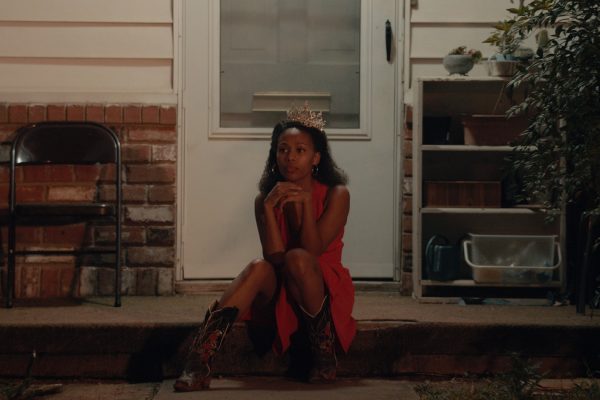Film Review: “Miss Juneteenth” — Hope Is Heart-wrenching
By Peg Aloi
There is a gemlike quality to this film: an emotional, earthbound portrayal of the lived experience of a Black woman — fighting to make ends meet, retaining her integrity despite repeated indignities.
Miss Juneteenth, directed by Channing Godfrey Peoples. Streaming at Coolidge Corner Theatre.

Nicole Beharie in Miss Juneteenth. Photo: Vertical Entertainment.
Part family drama and part coming-of-age story, this debut feature from Channing Godfrey Peoples stars Nicole Beharie (Jacob’s Ladder) as a former beauty queen forging a path, amid struggle and hardship, for her daughter. Perhaps not since the iconic 1974 classic Claudine has there been such an earthbound film about the lived experience of a Black woman — fighting to make ends meet, and retaining her integrity despite repeated indignities.
Beharie plays Turquoise Jones, “Turq” to her friends, a former winner of the local Miss Juneteenth pageant in her Texas hometown, Fort Worth. The pageant’s purpose is clear: to uplift a young Black woman and provide her with inspiration and an opportunity for success, mainly by awarding a scholarship to a historically Black college. Turq’s daughter Kai (excellent newcomer Alexis Chikaeze) is about to turn 15; Turq wants nothing more than to have her daughter follow in her footsteps and win first place in the pageant. Indeed, the Miss Juneteenth pageant consumes Turq’s life and priorities, as she works multiple jobs to pay the bills and to pay for the pageant’s fees and expenses. The opening scenes find her performing multiple duties at a local BBQ restaurant: cleaning the bathroom, stocking the bar, waiting on customers.
Kai and her mother are close, but the girl isn’t that interested in the pageant and its stilted etiquette classes: she’d rather join the dance club at school and hang out with her boyfriend. Turq is determined to give her daughter chances to move ahead that she never had. But, despite working tirelessly, Turq loses sight of necessities, such as paying the overdue electric bill, so she can afford a high-end gown for Kai’s pageant dress rehearsal. Kai’s ambivalence about the pageant is telegraphed early on; note her deadpan face as she looks at herself in the mirror while she’s wearing a frothy, frilly turquoise gown. The touches of color in the film’s costume design (by Rachel Dainer-Best, whose work in Assassination Nation, The Assistant, and other films is mighty impressive) slyly comment on Turq’s misplaced fantasies and desires. Kai’s father and Turq’s ex Ronnie (Kendrick Sampson in a charismatic performance) works as a mechanic; he makes mistakes that keep him from making good on his promises. He and Turq have a strong, passionate connection, yet her coworkers claim she makes “bad man choices.” Her boss at the local funeral home, Bacon (Akron Watson), is an intriguing character, part of the “black cowboy” community in Fort Worth. He attempts to woo Turq by arguing that she shouldn’t have to struggle financially, that she is “too good a woman” to live as she does. He is not without his charms. It’s clear that Turq is driven more by emotions than logic; ironically, unyielding work ethic undercuts her ability to make pragmatic decisions. Perhaps that is because she’s trying to recapture hopes and dreams that have been lost. By sticking to the past, she seems to lose sight of how to shape her family’s future And yet, as Turq’s boss at the BBQ joint says, “The American Dream’s not for Black folks.” Hard work and determination may not be enough.
Miss Juneteenth feels somewhat formulaic at times, as such domestic stories tend to do. But the strong cast transcends any weak interludes of melodrama. They forge strong connections in the world of the film, supplying powerful gestures and facial expressions, affecting moments of giddy humor or stern rebuke. A strong sense of family comes through, slightly broken as it may be: Turq’s mother Charlotte (Lori Hayes) hides her agonizing personal demons behind extreme religious devotion; it is penance, perhaps, for Turq’s turbulent upbringing. There is a good deal of soul searching and not a small amount of redemption in the face of life’s struggles and missteps.
Overall, Miss Juneteenth is engaging and moving. Daniel Patterson’s cinematography provides a solid sense of location and of contrasting lifestyles: the ambition and glamour of the pageant is juxtaposed with the mundanity of working-class existence. The naturalistic lighting serves the film’s moods beautifully. And, to its credit, the story provides at least some historical context, raising awareness about Juneteenth’s significance for contemporary African Americans (and everyone else), its racial uplift underscoring the ongoing struggle for equality, personal achievement, and the value of a strong sense of self.
Peg Aloi is a former film critic for the Boston Phoenix and member of the Boston Society of Film Critics. She taught film studies in Boston for over a decade. She writes on film, TV, and culture for web publications like Vice, Polygon, Bustle, Mic, Orlando Weekly, Crooked Marquee, and Bloody Disgusting. Her blog “The Witching Hour” can be found at themediawitch.com.
